BIMCO’s call for harmonized data supported at IMO
Overview
BIMCO’s continued call for the establishment of a harmonized data model to facilitate exchange of electronic data between ship and shore last week took a big step forward, as the initiative was met with support during an expert meeting at the International Maritime Organization (IMO).
In recent years, BIMCO has highlighted the problem of limited data included and exchanged in the Compendium to the Convention on Facilitation of International Maritime Traffic (FAL Convention) and called for an extension of data to be exchanged. At an expert meeting at the IMO last week, the IMO consequently decided to extend the Compendium to cover new data sets with the aim to ease port calls, eg. with regard to the Just-In-Time (JIT) approach.
A recent update (April 2019) of the FAL Convention comprised date elements used by the World Customs Organization (WCO), the United Nations Economic Commission for Europe (UN/ECE) and the International Organization for Standardization (ISO). However, the update only represented a part of the information that is normally exchanged between the ship and shore in order to get clearance. Last week’s update was therefore very positive, according to Manager, Maritime Technology and Regulation at BIMCO, Jeppe Skovbakke Juhl.
Co-operation – a prerequisite for more efficient port calls
The JIT concept refers to maintaining the most efficient ship operating voyage speed to arrive at the Pilot Boarding Place when availability is ensured of the berth, fairway and nautical services.
“Enhanced co-operation between shipowners, charterers, port authorities, terminal operators, and port service providers, is a prerequisite for more efficient port calls. There is, for example, a need to communicate accurate ship arrival and departure times and exchange information on berth availability and queue allocation. Such data model will now become an integrated part of the IMO data model,” Juhl says.
He explains that JIT operation of ships can support fuel and emission reductions by actively managing the ship's speed as well as optimizing the berth occupancy of the port. Additionally, it may improve the emission emitted and the safety of navigation as it enables the port to reduce the number of ships at anchorage.
“Ports shall be given the opportunity to receive real-time ETA data while the ship is en route to the arrival berth. Similarly, the ship will need to receive information on the berth availability. By sharing these relevant data, the parties gain insights on how well forthcoming and ongoing port calls are coordinated and synchronized,” says Juhl.
The outcome is well connected to the work of the International Taskforce Port Call Optimization, who are focusing on business process for data flow and ownership throughout the port call. The work by the Taskforce aims at improving the data quality as well as using the business process to identify barriers in contracts and operations.
Feedback or a question about this information?
VPS Bunker Alerts
Veritas Petroleum Services (VPS) publish regular Bunker Alerts based entirely on fuel samples and have kindly permitted BIMCO’s Members to access this information.
The Bunker Alerts are not intended to be an evaluation of overall bunker quality in the port or area concerned, but usually highlight a specific parameter within the fuel which has raised a quality issue.
Latest ice reports for members
Latest piracy reports
Latest industry releasable threats
ELSEWHERE ON BIMCO
Contracts & Clauses
All of BIMCO's most widely used contracts and clauses as well as advice on managing charters and business partners.
Learn about your cargo
For general guidance and information on cargo-related queries.
BIMCO Publications
Want to buy or download a BIMCO publication? Use the link to get access to the ballast water management guide, the ship master’s security manual and many other publications.
About a new business partner
We can help members check new business partners. We also help to recover millions of USD (undisputed) funds every year.





